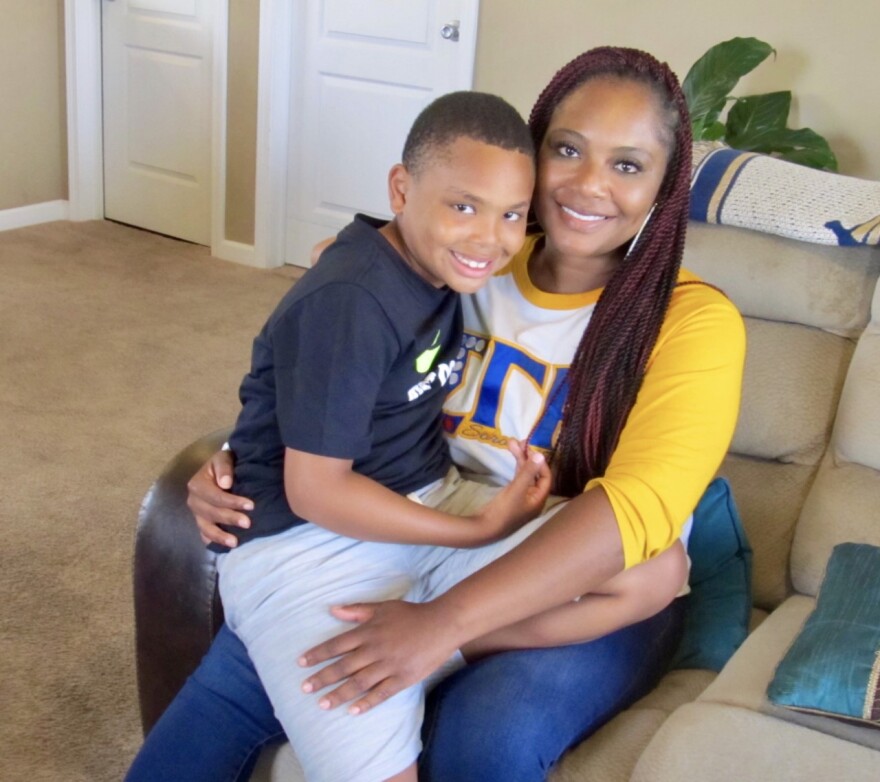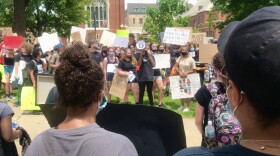This is the third in a three-day series. It aired Wednesday, June 24, 2020.
Across the country, African-Americans have protested with white allies in united outrage over George Floyd dying in police custody in Minneapolis last month. In Kalamazoo, most of the hundreds of participants at the larger protests are white. But as people of color start to plan next steps, some wonder: Will allies continue to work to end systemic racism once the big demonstrations stop?

“I’m pessimistic,” says JoVaughan Head, 33, a software manager raised on Kalamazoo's largely Black northern end.
Majyck D, a local community organizer who's marched, also has her doubts. And she has a theory why Blacks are outnumbered at the protests.
“It doesn't surprise me that there are mostly white people at rallies and protests. Black and Brown people, we're tired,” she explains. “These issues and complaints of racial disparity and harassment is nothing new. It’s just that no one has been hearing us.”
Majyck D says she's had to battle racism in the schools when her two adult African-American children were young. Now she directs her energy toward criminal justice reform as part of a multiracial, statewide organization.
She says it hurts her to see the racial imbalance at the protests.
“Why does it take for something horrific as an incident as this for you to speak up or say anything for Black and Brown people?”

Kim Guess, the mother of an 8-year-old boy, is among the African-Americans who have showed up. She, too, grew up on the North Side. She attended one protest, her first ever.
“When I got down there, I couldn’t believe it that it was 75 percent white. When I first arrived it was 75 percent white, and maybe 25 percent...Or maybe 20 percent Black and 5 percent of other.”
That trend has held at most of the big protests in downtown Kalamazoo. The larger ones began on Saturday, May 30th, five days after George Floyd died.
Be an advocate for us in your everyday life, and then take it and teach your children about implicit bias
JoVaughan Head, the 33-year-old from Kalamazoo, says he became frustrated by his sixth day of protesting.
"So, I became disheartened by the lack of action with the protests."
JoVaughan Head’s goal is lasting change. He has since joined a local African-American friend’s newly formed protest group that has an action arm that helps North Side residents meet pressing needs, such as small home repairs. He said allies have been an active part of the group.
Says Head: “Up until that point a lot of the protests had been organized by white folks. White allies, and things like that.”
JoVaughan Head, Kim Guess and Majyck D say they do welcome having white allies. But they would like them to be there for the long haul. And they also agree on this--that people of color must have significant presence in the racial justice movement. And they wonder if allies will keep pressing for racial justice once the demonstrations die down.
In that moment, I knew that I had to take a stand... I have to not just say it to my family, but I have to say it to those counterparts that I encounter that may not agree with me
Majyck D holds out hope that change in racial justice could come through the younger generation applying pressure on adults.
JoVaughan Head said that he’d consider it success if white allies, at the very least, made “anti-racist” ideas a daily practice.
“Be an advocate for us in your everyday life, and then take it and teach your children about implicit bias."
So if that’s one yardstick by which to measure success, it’s starting to happen, right here in the Kalamazoo area.
Kim Guess, the first-time protester and mother of an 8-year-old son, says the death of George Floyd has made her already close-knit mixed neighborhood even closer.
She says one of her neighbors is--and plans to do more--speaking out about racism. The video of a police officer kneeling for nearly nine minutes on Floyd’s neck deeply affected him.
“He was like: 'In that moment, I knew that I had to take a stand '" on social media and in person, recalls Guess. “'I have to not just say it to my family, but I have to say it to those counterparts that I encounter that may not agree with me.' ”
The series is airing 7:50 a.m. and 4:50 p.m. Monday, June 22 through Wednesday, June 24 during Morning Edition and All Things Considered on WMUK 102.1 FM, the National Public Radio Station based at Western Michigan University.








